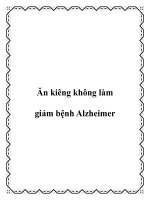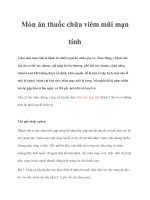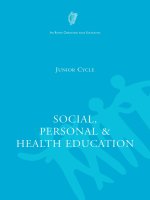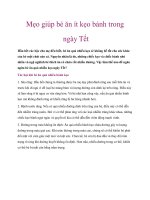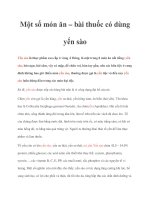AN ROINN OIDEACHAIS AGUS EOLAÍOCHTA: JUNIOR CYCLE potx
Bạn đang xem bản rút gọn của tài liệu. Xem và tải ngay bản đầy đủ của tài liệu tại đây (250.43 KB, 60 trang )
AN ROINN OIDEACHAIS AGUS EOLAÍOCHTA
JUNIOR CYCLE
SOCIAL,
PERSONAL &
HEALTH EDUCATION
Aims and Principles
1. The general aim of education is to contribute
towards the development of all aspects of the
individual, including aesthetic, creative, critical,
cultural, emotional, intellectual, moral, physical,
political, social and spiritual development, for
personal and family life, for working life, for
living in community and for leisure.
2. The Junior Certificate Programme is designed to
meet the needs of all students in second-level
education. Arising from this, every subject is
offered at two levels, ordinary and higher. In the
case of English, Irish and Mathematics a
foundation level is also available.
3. The Junior Certificate Programme aims to
• reinforce and further develop in the young
person the knowledge, understanding, skills
and competencies acquired at primary level;
• extend and deepen the range and quality of
the young person’s educational experiences
in terms of knowledge, understanding, skills
and competencies;
• develop the young person’s personal and
social confidence, initiative and competence
through a broad, well balanced general
education;
• prepare the young person for the
requirements of further programmes of study,
of employment or of life outside full-time
education;
• contribute to the moral and spiritual
development of the young person and to
develop a tolerance and respect for the
values and beliefs of others;
• prepare the young person for the
responsibilities of citizenship in the national
context and in the context of the wider
European and global communities.
4. The Junior Certificate Programme is based on the
following principles:
Breadth and balance
At this stage of their school career, every student
should have a wide range of educational
experiences. Particular attention must be
given to reinforcing and developing the skills
of numeracy, literacy and oracy. Particular
emphasis should be given to social and
environmental education, science and
technology and modern languages.
Relevance
Curriculum provision should address the
immediate and prospective needs of the young
person, in the context of the cultural, economic
and social environment.
Quality
Every young person should be challenged to
achieve the highest possible standards of
excellence, with due regard to different aptitudes
and abilities and to international comparisons.
5. Each Junior Certificate Syllabus is presented for
implementation within the general curriculum
context outlined above.
THE JUNIOR CERTIFICATE
DEPARTMENT OF
EDUCATION AND SCIENCE
SOCIAL, PERSONAL
AND HEALTH
EDUCATION
JUNIOR CYCLE
JUNIOR CYCLE SOCIAL, PERSONAL AND HEALTH EDUCATION
•
INTRODUCTION
1. Rationale 3
2. Aims 4
3. SPHE in the school 5
3.1 The whole school 5
3.2 The role of the principal 5
3.3 Timetabling 6
3.4 Cross-curricular support 6
3.5 Core Values 6
3.6 The needs of the students 6
3.7 Teachers of SPHE 6
3.8 Home school links 7
4. SPHE at post-primary level
4.1 Current provision 8
4.2 An enabling curriculum 8
4.3 Relationships and sexuality education (RSE) 8
5. Assessment and certification of SPHE 9
6. Programme structure 10
7. Planning an SPHE programme 11
Overview of year 1 12
Modules for year 1 14-27
Overview of year 2 28
Modules for year 2 30-41
Overview of year 3 42
Modules for year 3 44-54
CONTENTS
JUNIOR CYCLE SOCIAL, PERSONAL AND HEALTH EDUCATION
•
The general aim of education is to contribute towards
the development of all aspects of the individual,
including the aesthetic, creative, cultural, emotional,
intellectual, moral, physical, political, religious, social
and spiritual development, for personal and family life,
for living in the community, and for leisure.
Commitment to education in the area of personal
and social development arises out of this holistic aim
of education and its underlying vision of the person.
Such a commitment also emerges from a holistic vision
of health–one that encompasses all the dimensions of
life, including the physical, mental, emotional, spiritual,
social and environmental, and the complex interplay
between these dimensions which contributes to personal
well-being and to positive inter-personal relationships.
Out of this holistic vision of the person, which is at the
heart of our understanding of education and health,
emerges a growing recognition that the social, personal
and health education offered to our young people is as
important as any other area of the curriculum. Just as
support for personal and social development contributes
to self-fulfilment, it is also a prerequisite for successful
learning; a young person who has a high degree of
self-worth, a sense of security and a positive self-image
will be more predisposed to school life and to the variety
of learning situations it offers. He/she will be aware of
the relationship between life-style, environment and
health and well-being and conscious of the challenge
to support personal, family and policy choices that
promote health, in all its dimensions.
Social, personal and health education (SPHE) provides
students with a unique opportunity to develop the skills
and competence to learn about themselves and to care for
themselves and others and to make informed decisions
about their health, personal lives, and social development.
All these decisions must be made in the context of the
wider community. Support from the Board of
Management, from the wider community and in
particular from parents will be necessary for the successful
implementation of a school’s programme of SPHE. With
such support, students can be enabled to participate as
active and responsible adults in the personal and social
dimensions of society and to make responsible decisions
that respect their own dignity and the dignity of others.
3
1. A RATIONALE FOR SOCIAL, PERSONAL
AND HEALTH EDUCATION (SPHE)
•
JUNIOR CYCLE SOCIAL, PERSONAL AND HEALTH EDUCATION
•
4
2. THE AIMS OF SPHE
Building on the aims of SPHE in the primary school,
at post-primary level SPHE aims
• to enable the students to develop skills for self-fulfilment
and living in communities
• to promote self-esteem and self-confidence
• to enable the students to develop a framework for responsible
decision-making
• to provide opportunities for reflection and discussion
• to promote physical, mental and emotional health and well-being
•
JUNIOR CYCLE SOCIAL, PERSONAL AND HEALTH EDUCATION
•
3.1 THE WHOLE SCHOOL
The processes of all teaching and learning have
implications for personal and social development.
The ways in which members of the staff relate to one
another and to the students, and the quality of
relationships between the students themselves, form the
foundation for personal and social development in a
school. Therefore, every teacher and staff member, every
class and extracurricular activity has offered and
continues to offer opportunities for enhancing the
personal and social development of the student.
A supportive school environment is essential if SPHE
is to be effective. In such an environment,
• people feel valued
• self-esteem is fostered
• respect, tolerance and fairness are evident
• high expectations and standards are promoted
• there is support for those with difficulties
• open communication is the norm
• effort is recognised and rewarded
• uniqueness and difference are valued
• conflict is handled constructively
• initiative and creativity are encouraged
• social, moral and civic values are promoted.
The principles of fair play, respect, tolerance and reward
for effort must permeate the whole school climate;
they cannot be compartmentalised into SPHE.
The development of an appreciation for learning,
respect and caring for self and others, a sense of
belonging and a sense of social responsibility–these
are tasks of the whole school community.
Curricular provision for SPHE can contribute to
and benefit from a supportive school environment.
However, the effectiveness of any SPHE programme
offered is seriously undermined if principles such as
those outlined above are not in operation in the
whole school environment.
In addition to these whole-school factors there are
a number of contextual and environmental factors that
influence social, personal and health education.
The socio-economic background of the students as well
as their physical and cultural environment can have a
significant impact on the range of choices and options
that students may face. Schools should give due regard
to these contextual factors in planning for social,
personal and health education.
3.2 THE ROLE OF THE PRINCIPAL
The leadership of the principal is a significant factor in
sustaining a supportive environment for SPHE in a
school. The principal sets the tone for the school;
her/his decisions and priorities have a direct impact on
whole-school climate. In addition to the leadership
given by the principal at a personal and professional
5
3. SPHE IN THE SCHOOL
•
JUNIOR CYCLE SOCIAL, PERSONAL AND HEALTH EDUCATION
•
level, the priority given to SPHE by a Board of
Management in a school plan can be seen as a clear
statement of support at policy level. Many of the
excellent SPHE programmes now established
in schools are due to the conviction, commitment
and continuing support of principals and Boards
of Management.
The value of SPHE in the school will be expressed
and perceived in timetabling, the assigning of teachers,
and the provision of resources.
3.3 TIMETABLING
Circular M22/00 states that the recommended time
allocation is the equivalent of one class period per week,
organised in the manner that best meets the needs
of the students and school organisation.
This curriculum has been prepared in the light
of such an allocation.
3.4 CROSS-CURRICULAR SUPPORT
The value of cross-curricular support for elements of
an SPHE programme and for the values and
dispositions promoted by SPHE should not be
underestimated. Subjects such as religious education,
science and home economics may also deal with topics
related to SPHE; but given the provision for choice
within the junior and senior cycle at second level, and
the methodological approach that is at the core of
SPHE, the main focus of the programme should be on
the designated class period. SPHE has a particular role
as a key element of health promotion, and requires
designated time in order to fulfil that function.
3.5 CORE VALUES
Many schools have worked on the development of a
school plan or mission statement, which sets out the
core values that inform school policy. Some schools have
been introduced to such policy statements through
the implementation of relationships and sexuality
education. The core values articulated in a school
plan will obviously inform every aspect of school life;
but they will have particular relevance to a school’s
SPHE programme.
3.6 THE NEEDS OF THE STUDENTS
SPHE must be considered in the context in which the
students find themselves and the changing social and
cultural milieu in which they form relationships and
make decisions and choices. While the principle of
relevance is one that should inform the whole curriculum,
it has particular implications for SPHE. Students should
be challenged to critically examine this ever-changing
context and given the skills that empower them
“to participate fully and creatively in their communities”
(Charting our Education Future, p.10.)
3.7 TEACHERS OF SPHE
Given the importance of the whole-school climate for
successful SPHE, it is clear that in many ways every
teacher in a school is a teacher of SPHE. Teachers
directly involved in an SPHE programme in a school
have a particular responsibility and require particular
support. Teachers assigned to SPHE must have an
understanding of and a familiarity with the
methodologies associated with education in this area.
SPHE should not be assigned to teachers without
consultation. All teaching is challenging, but teaching
an SPHE programme is a particular challenge,
6
•
JUNIOR CYCLE SOCIAL, PERSONAL AND HEALTH EDUCATION
•
demanding a range of skills and a high degree of
sensitivity. Those involved in the SPHE programme
in a school will need continuing support from
their colleagues, from the principal and Board of
Management, and from a range of other agencies
that are in a position to offer in-career support.
Close links will be needed between the pastoral care
system in a school and those involved in the teaching of
SPHE. Some schools formalise these links by including
the teaching of SPHE in the role of class tutor.
Planned communication and co-operation between
those involved in SPHE and the guidance personnel in
school will be essential for the effectiveness of both
SPHE and guidance in the school.
3.8 HOME-SCHOOL LINKS AND SPHE
Links between home and school play a vital role in
supporting the efforts of parents and guardians in the
home and the work of the teachers in the classroom.
Such links are particularly important in SPHE.
Beginning with pre-entry meetings before a student
enters the school, schools need well-structured
continuing links with the lives of the students outside
the classroom and outside the school. Such links can
inform an SPHE programme; they can help teachers to
prioritise modules. These links can also provide parents
with strategies for supporting the work of the school in
its SPHE programme. Structured and continuing links
can contribute to an SPHE programme that is relevant
to the needs of students and the expectations of their
parents and guardians.
7
•
JUNIOR CYCLE SOCIAL, PERSONAL AND HEALTH EDUCATION
•
8
4.1 CURRENT PROVISION
It is clear that in recent years there has been a huge
upsurge of interest in the broader aspects of the school
curriculum. An ever-growing number of schools has
come to the conclusion that, in order to meet the
holistic aim of education and the curriculum, students
should be exposed to a wide variety of learning
experiences that will enable them to develop the
qualities and dispositions necessary for effective
learning at school and participation in adult life.
Over the years schools have adopted a variety of ways
in which to meet the SPHE needs of the students.
The Departments of Health and Children and
Education and Science, in co-operation with other
agencies, have made resources and training available in
this area. Some schools offer pastoral care programmes,
drawing on the expertise of a variety of individuals,
institutes and training bodies for support and resource
material. Resource material on a variety of topics has
also been made available by voluntary and other groups
and commercial interests.
The setting up of a tutor system in many schools, and
staff training in effective tutor roles, have contributed to
a positive climate and atmosphere in these schools.
The leadership of principals has been a key factor
in initiating and supporting this and any other
pastoral care structure.
4.2 AN ENABLING CURRICULUM
The provision of a curriculum and teacher guidelines
for SPHE at post-primary level is in no way intended
to supplant or terminate the excellent and indispensable
work already in progress. The curriculum offers a
framework for many existing programmes and an
incentive for schools to make formal provision for
SPHE. It is an enabling curriculum which will support
work already being done in SPHE and offer guidelines
for that and future work. In this regard the NCCA
course committee has drawn on the expertise of bodies
and groups offering materials and training in this area.
4.3 RELATIONSHIPS AND SEXUALITY
EDUCATION (RSE)
The Interim Curriculum and Guidelines for
Relationships and Sexuality Education indicates that the
context for RSE in post-primary schools will be within
social, personal and health education. The outline for
junior cycle suggested in the Interim Curriculum and
Guidelines has been incorporated into the RSE module
of each of the three years of this syllabus. In planning
for this module, a school will be guided by its policy on
relationships and sexuality education which will have
been prepared in consultation with parents, teachers,
and management authorities.
A section of the guidelines for social, personal and
health education will incorporate the remainder of
the topics addressed in the Interim Curriculum and
Guidelines for Relationships and Sexuality Education.
4. SPHE PROGRAMMES AT POST PRIMARY LEVEL
•
JUNIOR CYCLE SOCIAL, PERSONAL AND HEALTH EDUCATION
•
9
5. ASSESSMENT AND CERTIFICATION OF SPHE
SPHE will not be formally examined in the Junior
Certificate examination as at present configured.
The modes and techniques of assessment that have
been in use for national certification purposes are not
appropriate to the content or methodology of SPHE.
Neither is it appropriate that students should be
certificated at national level in SPHE, in the Junior and
Leaving certificate examinations. However, as part of
the school curriculum, with stated aims and outcomes,
SPHE must be open to assessment and evaluation.
These fall into three broad categories:
5.1 STUDENT SELF-ASSESSMENT AND
PEER ASSESSMENT
Such assessment might be done in class with the
students provided with questionnaires and/or
worksheets on which they might record their own
perceived progress in a given skill. Rather than an end of
module activity for students, such self-assessment should
be seen as an integral part of the teaching, learning and
assessment process. Self-assessment tools should be
based on clearly stated criteria–criteria that must be
clear to the students as well as to the teacher. Without
such criteria, self-assessment can become a chore and
even a hindrance to effective learning. When the criteria
are clear and the assessment instrument relevant and
stimulating, self-assessment can be a powerful motivator.
Some outcomes of self-assessment must be private.
However, teachers, reacting effectively to some of the
insights of the students, can modify or extend the SPHE
programme in the light of those insights.
Peer assessment could be used by groups of students to
evaluate how well they worked as a team, for example.
It is facilitated by the teacher, and training in this skill
might be provided in the context of training for SPHE.
5.2 ASSESSMENT OF STUDENTS
This might involve the assessment of the students’ work
and skills through specific tasks, homework, or project
work. Samples of work done in SPHE might be kept by
the students as a record of achievement. Such work
might be shown and discussed at home.
Time spent on SPHE is important and valuable time.
The possibility of a certificate of completion being
awarded by a school at the end of a term, year or
module of work should be considered. The provision of
national certification for students who complete an
SPHE programme in the junior cycle of post-primary
schools is to be explored.
5.3 PROGRAMME EVALUATION
This would involve continuous evaluation of the
programme structure and materials in a school.
All involved in SPHE–parents, teachers, students,
and management–might contribute to this.
•
JUNIOR CYCLE SOCIAL, PERSONAL AND HEALTH EDUCATION
•
This curriculum for SPHE in the junior cycle is presented in ten modules,
each of which appears in each year of the three-year cycle.
Belonging and integrating
Self-management: a sense of purpose
Communication skills
Physical health
Friendship
Relationships and sexuality
Emotional health
Influences and decisions
Substance use
Personal safety
10
THE STRUCTURE OF AN SPHE PROGRAMME
•
JUNIOR CYCLE SOCIAL, PERSONAL AND HEALTH EDUCATION
•
11
PLANNING AN SPHE PROGRAMME
The outline that follows offers schools a flexible
framework within which schools can plan for the
SPHE programme most suitable for the students
and the school.
The following points should be noted when planning
an SPHE programme:
ALLOCATING TIME TO A TOPIC
The topics within each module are outlined and the
aims and outcomes indicated. Not every topic would
take a whole class period; other topics may require a
number of class periods.
ORDERING THE MODULES
Schools or teachers may order the modules according to
school or class needs and circumstances. However, it is
strongly recommended that the modules on friendship
and relationships and sexuality be closely linked.
OVERLAPPING OF AIMS OR TOPICS
Modules may contain topics or aims that are
common to other modules in the three-year programme.
Such an overlap is essential to an integrated and
holistic programme; topics and skills should be
revisited often under different headings and from
a variety of perspectives within a spiral and
developmental programme.
RELATIONSHIPS AND SEXUALITY EDUCATION
Planning for the relationships and sexuality module
should be undertaken in the light of school policy
in this area.
The Teacher Guidelines for SPHE deal with
programme planning in greater detail.
•
JUNIOR CYCLE SOCIAL, PERSONAL AND HEALTH EDUCATION
•
OVERVIEW OF YEAR 1
12
Modules Topics
Belonging and integrating
Self-management:
a sense of purpose
Communication skills
Physical health
Friendship
1. Coping with change
2. Joining a new group
3. Appreciating difference
4. Bullying is everyone’s business
5. Coping with loss
1. Organising myself
2. Organising my work at home and in school
3. Balance in my life
1. Express yourself
2. Learning to listen
3. Passive, assertive and aggressive communication
1. Body care
2. Healthy eating
3. Exercise
1. Making new friends
2. A good friend
YEAR 1
OVERVIEW OF YEAR 1 (CONTINUED)
•
JUNIOR CYCLE SOCIAL, PERSONAL AND HEALTH EDUCATION
•
13
Modules Topics
Relationships and sexuality
Emotional health
Influences and decisions
Substance use
Personal safety
1. Me as unique and different
2. Friendship
3. Changes at adolescence
4. The reproductive system
5. Images of male and female
6. Respecting myself and others
1. Recognising feelings
2. Respecting my feelings and the feelings of others
1. My heroes
1. Why use drugs?
2. Alcohol: the facts
3. Smoking and its effects
4. Smoking: why, why not?
1. Looking after myself
YEAR 1
•
JUNIOR CYCLE SOCIAL, PERSONAL AND HEALTH EDUCATION
•
14
BELONGING AND INTEGRATING
Self-esteem depends on many factors; feeling secure is one of the most important.
This module deals with two events that can affect that security: the transition
from primary to post-primary school, and the experience of loss.
Topic Aims
1. Coping with change
2. Joining a new group
3. Appreciating difference
4. Bullying is everyone’s
business
5. Coping with loss
• To enable the students to reflect on change in
their lives–physical, social, emotional, etc.
• To help the students to cope with the transition
from primary to second-level education
• To build on the skills for working in groups
introduced at primary level, with particular
reference to the setting of rules for group work
• To promote awareness of the needs of others
• To help the students to recognise and value their
own gifts and talents and those of others
• To help the students to identify and label
bullying behaviour
• To explore possible personal and group responses
to such behaviour
• To familiarise the students with the procedures
in their school for responding to bullying
• To enable the students to identify different
types of loss
• To help the students to identify the personal,
emotional and social consequences of each
type of loss
YEAR 1
•
JUNIOR CYCLE SOCIAL, PERSONAL AND HEALTH EDUCATION
•
15
As a result of participating in this module, students should:
OUTCOMES
• have reflected on their current stage of development
• have further developed their group work and communication skills
• have a heightened sensitivity to their own talents and those of others
• be aware of their responsibilities as members of the school community
• be aware of the characteristics of bullying behaviour
• have a knowledge of school policy on bullying and a willingness
to adhere to that policy
• be familiar with types and consequences of loss
• be able to identify the member of the staff to approach if necessary.
YEAR 1
•
JUNIOR CYCLE SOCIAL, PERSONAL AND HEALTH EDUCATION
•
16
SELF-MANAGEMENT:
A SENSE OF PURPOSE
The focus of this module is on the development of good skills for personal organisation
and effective work and leisure habits. The importance of teamwork is also addressed.
Topic Aims
1. Organising myself
2. Organising my work at
home and in school
3. Teamwork
4. Balance in my life
• To facilitate the development of planning
and preparation skills
• To help the students to develop good study habits
• To help the students to identify the advantages
of good teamwork and the challenge of being
an effective team member
• To help the students to be aware of their own
limitations and the necessity to seek help and
advice from others
• To help the students in the organisation of
their time around work, leisure, and rest
• To explore what it means to be healthy
As a result of participating in this module, students should:
OUTCOMES
• be able to plan and organise their school and homework efficiently
• have a greater awareness of the importance of teamwork
• have a broadened vision of what it means to be healthy.
YEAR 1
•
JUNIOR CYCLE SOCIAL, PERSONAL AND HEALTH EDUCATION
•
17
COMMUNICATION SKILLS
The ability to communicate is essential for healthy personal and social development.
The focus in this module is on reinforcing basic skills for self-expression and for listening.
In addition, students are introduced to different types of communication and the
contexts for their use.
Topic Aims
1. Express yourself
2. Learning to listen
3. Passive, assertive and
aggressive communication
• To enable the students to develop skills for
expressing their own opinions and asking
constructive questions
• To help the students to develop skills for
listening to others
• To develop awareness of the importance
of sensitivity to the opinions of others
• To help the students to differentiate between
passive, assertive and aggressive forms of
communication
• To help the students to be sensitive to the
appropriateness or inappropriateness of different
forms of communication in different contexts,
in particular when relating to adults
• To further develop skills for conflict management
As a result of participating in this module, students should:
OUTCOMES
• have learnt and practised the skills of listening and of self-expression
• be more aware of the need to be sensitive to the opinions of others
• know and understand different types of communication
• be aware of the appropriateness of different types of communication
• have learnt skills for conflict resolution.
YEAR 1
•
JUNIOR CYCLE SOCIAL, PERSONAL AND HEALTH EDUCATION
•
18
PHYSICAL HEALTH
Physical health is one element of personal health and well-being. Other elements–including
the emotional, sexual, and social–are addressed elsewhere in junior cycle SPHE.
The focus in this module is on life-style patterns that support good physical health.
Topic Aims
1. Body care
2. Healthy eating
3. Exercise
• To emphasise the importance of washing
and body care, especially in adolescence
• To explore the links between personal hygiene
and positive self-image
• To make the students aware of the elements of
a balanced diet and the importance of healthy
eating for physical and mental well-being
• To develop awareness of the importance of rest
and exercise for health and well-being
• To help the students to identify possibilities
for daily and weekly exercise in their own lives
As a result of participating in this module, students should:
OUTCOMES
• have an appreciation of the importance of personal hygiene for self-esteem
and confidence
• understand what is meant by a balanced diet and its implications for
general health and well-being
• appreciate the importance of physical exercise, rest, and sleep
• have drawn up a personal plan for exercise in their own lives.
YEAR 1
•
JUNIOR CYCLE SOCIAL, PERSONAL AND HEALTH EDUCATION
•
19
FRIENDSHIP
The transition to post-primary school can separate students from their childhood
friendships. There is added pressure on students who move from a single-sex into a
co-educational environment. This module offers opportunities to explore these issues.
Topic Aims
1. Making new friends
2. A good friend
• To help the students to explore the nature
and meaning of friendship
• To identify the characteristics of a good friend
As a result of participating in this module, students should:
OUTCOMES
• have a heightened awareness of the nature of friendship
• have examined the characteristics of a good friend.
YEAR 1
•
JUNIOR CYCLE SOCIAL, PERSONAL AND HEALTH EDUCATION
•
20
RELATIONSHIPS
AND SEXUALITY EDUCATION
This module will be prepared in accordance with school policy on relationships and
sexuality education. Further details are included in the Teacher Guidelines for Social,
Personal and Health Education.
Topic Aims
1. Me as unique and different
2. Friendship
3. Changes at adolescence
4. The reproductive system
5. Images of male and female
6. Respecting myself
and others
• To develop skills for promoting self-esteem
• To further explore the qualities valued
in friendship
• To help the students to identify their
responsibilities in different types of relationships
• To help the students to understand the physical,
emotional and psychological changes that take
place during adolescence
• To help the students to appreciate that these
changes occur at different times and at different
rates, depending on the individual
• To enable the students to clarify their information
on the male and female reproductive systems,
intercourse, and conception
• To enable the students to deepen their
awareness of stereotyping and its influence on
attitudes and behaviour
• To identify some contemporary attitudes
to sexuality
• To help the students to recognise the need for
respect for sexuality
YEAR 1
•
JUNIOR CYCLE SOCIAL, PERSONAL AND HEALTH EDUCATION
•
21
As a result of participating in this module, students should:
OUTCOMES
• have an appreciation of their personal talents and those of others
• have explored some aspects of sex stereotyping
• have a knowledge of the physical, emotional and psychological
changes related to adolesence
• have a clear understanding of the male and female reproductive systems
• be sensitive to the need for respect for one’s own sexuality and the
sexuality of others.
YEAR 1



